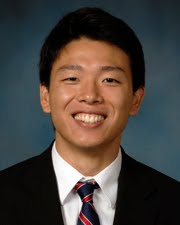Sam Du

Though he was raised by two scientists, Sam Du resisted the urge to pursue basic science. Guided by the inspiration he drew from his experiences as an EMT, Du decided to pursue medicine instead, and he is now a second year student at the University of Maryland School of Medicine in Baltimore.
As an undergraduate, he majored in cell biology and molecular genetics at the University of Maryland College Park. He defended a thesis about the host-pathogen interactions of leishmaniasis with Professor Norma W Andrews. The Kean Fellowship will fund his travel to Natal, Brazil where he continue his study of leishmaniasis with patients at an infectious disease hospital. He is an Infectious Disease Society of Medical Scholar, HHMI Undergraduate Research Fellow, and winner of the Ruth Dr. Emmett & Ruth A. Light Medical School Scholarship.

Project: "The Relationship of Serum Cytokines and their Cellular Sources with Visceral Leishmaniasis Disease Progression"
June 1, 2013 - August 1, 2013
Natal, Brazil
What does the Kean Fellowship mean to you?
My acceptance as a Kean Fellow came as a complete surprise. I did not expect to do so well among such talented peers, so it is extremely gratifying to be recognized by a community that I hope to soon join. This positive feedback encourages me to redouble my efforts.
What do you anticipate learning?
When I become a clinician, I want to be a citizen of the world. The research group I worked with builds relationships with patients and helps connect them with researchers through international collaborations. This sort of collaboration can serve as a model for my goals of global citizenship. Meeting these patients first hand was especially valuable because these are cases rarely seen in the United States. Additionally, this trip was my first chance to see healthcare in another country. In the past few years Brazil has made some major strides, but it still faces many difficulties with its healthcare system. A small handful of doctors are expected to care for a huge number of patients using insufficient facilities and equipment. I joined healthcare workers as they took to the streets to protest poor hospital conditions. Lab tests have multi-month turn around times and some hospitals are even unable to afford gloves. This scene plays out all over the world and as I continue my medical career, I will develop skills to help the many needy in developing countries.
What interests you about tropical medicine and what problems are you interested in solving?
What I love most about medicine is getting to know people and using that relationship to better their lives. As with any health problem, I believe the best way to tackle infectious disease is with prevention and education. This is why I am so excited about the work that we did in Brazil. While our research focused on the immunology of Visceral Leishmaniasis, our process for recruiting patients helped keep patients from slipping between the cracks. Patients traveled for hours from remote areas to seek treatment at the infectious disease specialty center. Many had waited months to see a local doctor and then more months before coming to see us. Once we had met the patients, we could teach them about the disease and engage them as liaisons in their communities. Establishing a relationship with patients allowed us to travel to their homes to meet with their communities for additional screening and education. Seeing the doctor patient relationship work effectively was extremely gratifying.